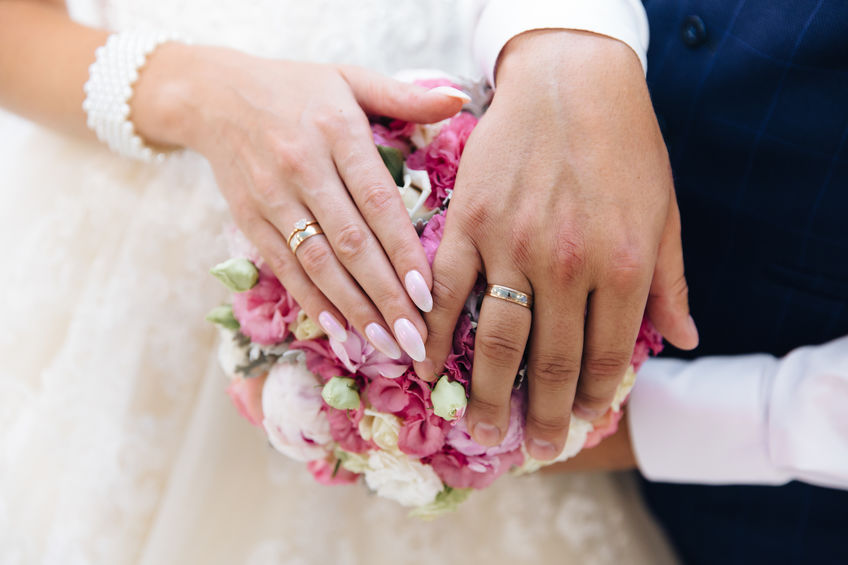A lot of time and effort is put into a wedding ceremony and the day as a whole. But without the rings, it would be nothing more than a pretty dance party—the rings add the symbol of a never-ending circle and life-long marriage and commitment to the other person.
That symbol holds a lot of tradition and significance in today’s world.
Typically, it is tradition for the groom to pay for the bride’s engagement ring and wedding band, and for the bride to pay for the groom’s wedding band. Each buys the other’s ring, with the support of their family if needed. Today, this is sometimes changed to better fit the couple’s preferences.
The person who buys the wedding ring, and a variety of other things, should be discussed by the couple before they begin shopping for rings.
It will be important to know what you want before you begin so that you can walk into a jeweler with a specific purpose in mind.
Common Wedding Etiquette

There are a few unspoken rules about who buys what, even though most have been ingrained in us through tradition.
If the groom pays for the bride’s ring, and the bride pays for the groom’s ring, then who pays for the rest of the wedding and all the expenses that come with it? The answer is quite simple.
It is all up to you to discuss with your spouse and your respective families. When thinking through the lenses of tradition.
However, the bride and her family would be expected to pay for the bulk of the wedding ceremony needs, including invitations, dresses, venues, food, decorations, and other things.
They would also arrange for someone to marry them and plan the event as a whole, though help from the groom can be offered.
While the bride pays for the wedding and reception, oftentimes the groom and his family will be responsible for the rehearsal dinner (if there is one).
Other events held before and around the wedding, like a bachelor or bachelorette party, can be paid for by either family or even by friends of the couple as a token of support.
Traditionally, the groom also pays for the entirety of the honeymoon expenses.
It is quite interesting when you think about it.
To get married, the groom must pay for a wedding band and ring.
Once the engagement ring has been purchased, the bride pays for his wedding band, and almost the entirety of the wedding, but after the wedding is complete, the bulk of the financial responsibility transfers to the husband for the honeymoon.
Buying Rings

Rings are an important aspect of marriage within our society.
Engagement rings are used to display your impending commitment from the time of the proposal to the time of the wedding.
There is quite a bit of history behind why that happens, as well as why we wear wedding bands, but that’s a story for another day.
Wedding bands are typically less elaborate than engagement rings and are worn after they are exchanged at the wedding.
They are then worn for the duration of the marriage.
It signifies the love and commitment that you have for another person, and sometimes that means you spend a pretty penny on its purchase.
Everyone knows that the groom usually buys the engagement ring as he will use it to propose, but the lines get a little blurry when it is time to buy the wedding bands.
As mentioned above, in most cases, the groom will buy the bride’s ring, and the bride will buy the groom’s ring.
In earlier time periods, this normally entailed monetary support from each spouse’s family, but these days it is much more individual.
Normally, the couple will pay for the rings either together or separately.
The best way to decide what to do about this is to just talk to the other person in your relationship!
Communication will be crucial throughout your marriage, so why not start talking now about important matters such as this?
Together you can decide if you will pool your money for the rings or if you will use your own savings to buy one for each other.
It will all depend on your situation and how closely you want to stick to traditional or non-traditional ways.
Money can be split up by who is paying for what.
At times, the groom has been expected to pay for the two wedding bands, his own and hers, as well as the engagement ring, because the bride and her family will pay for the bulk of the wedding.
All in all, it can all be planned out and organized as the couples please because many social norms and traditions concerning wedding bands have adapted and are no longer expected.
More Topics of Discussion
Discussing how to purchase the wedding bands can be the beginning of quite a few more conversations that should probably follow.
In most cases, as soon as you walk into any jewelry store they will ask you what you are looking for.
You will hear things like ring size, ring color, ring metal, diamonds, gemstones, moissanite, lab-grown diamonds, carat, and a variety of others words you may not be familiar with.
Discussing things like this beforehand could be quite beneficial as you try to explain what you want and need for an engagement or wedding band.
Another very important thing to discuss is the price.
What is your price range? How much should you spend on the groom’s ring? How much does the bride expect you to pay for her’s?
Understanding one another’s expectations first and then working out the best solution will help you both be on the same page while shopping for rings and other bought necessities for the wedding.
Be sure to discuss all these things and have a price range ready to tell your jeweler.
It may also be helpful to come prepared with a couple of pictures of the style of engagement and wedding band you want to have.
Maybe you want to match your rings to your spouse’s. Or maybe you don’t want any diamonds in the wedding band, while the other person wants a lot.
You can find exactly what you want if you look hard enough!


